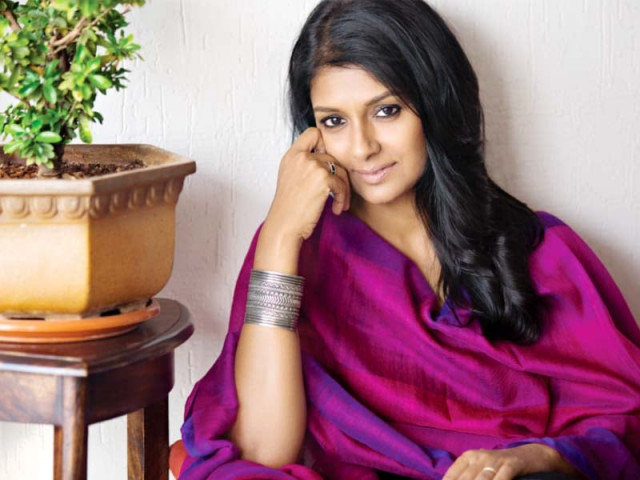Nandita Das on being comfortable in her own skin
The actor talks about her admiration for Manto, getting noticed in an industry that places a premium on fairness

Nandita believes youngsters shouldn’t bother about thinking where they fit in the social hierarchy. PHOTO: VIDHI THAKUR
“I never bleach my face,” says Nandita Das. Stunningly beautiful in a plain gray kurta, here is a woman whose description always has prefixes and suffixes like ‘dark and dusky’ or ‘earthy’ in write-ups about her. But Nandita is more than these qualifications.
We are sitting in Lahore on a chilly March morning in the home of Nuzhat Manto, Saadat Hasan Manto’s daughter, where Nandita is a house guest. She sips healthy green tea and nibbles on unhealthy mithaai. All she needs is a subtle cue and starts to talk, because Nandita has a lot to say. She feels talking about herself, “is corroding” to her persona, but admits that this is an occupational hazard and hence, agreed to do this interview.
“I don’t even get a facial more than once a year. My mother never got her face bleached. She is 72 and has great skin. I stay away from artificial things,” she says, and shares that she has had emails from young girls wanting to commit suicide because they were unable to be fair, because they were disappointing their parents, because they would never find the right husband. “I internalise all this so much that I feel I must correct this, so I do the exact opposite. I almost asexualise myself… one reason why I have always worn dheela (loose) kurtas.”
As perhaps the most popular face of the ‘Dark is Beautiful’ campaign, she condemns the ‘gora complex’. “The big companies are cashing on this prejudice. It is not a standalone issue. I grew up as a dark person in a country like India. In the film industry, the few dark actresses we had have also progressively become fairer, like Rekha and Kajol. We take on the burden of looking good all the time. We, women, objectify ourselves. If we all look like Barbie dolls, how uninteresting the world would be. I see young girls who have completely lost their sense of self-worth because they are trying to fit into that standardised notion of beauty. Can you imagine the struggle? They spend all that time doing that instead of discovering their talent or being happy.”
The actor is considered, by many, one of the most attractive women of Indian cinema. “But that’s all about perception. Some might say ‘she is so dark’! There is always a hierarchy in things. Some people will be above you, others below you. If I waste my time thinking where I fit in that hierarchy of things...There’s so much to do. Travel. Eat good food. Meet interesting people,” she says, adds that people label her as being attractive to the intelligent man.

“There’s a word for people who find intelligent people attractive… yes… sapiosexual. If at all somebody finds me attractive, I hope it is not just for what I look like because there is more to all of us.” Yet, Nandita does not like looking unkempt. “Without Kajal I feel dead. But if there are 10 things I want to do today, looking good is the 11th thing, “says the actor who doesn’t carry cosmetics in her handbag and announces that she is 45. Actor, director, social activist, writer, wife and mother of a four-and-a-half year old boy, she juggles many roles. She is faced with the dilemma of every working woman who is a mother. “But at the same time, your work gives you a sense of purpose in life. If I’m not a happy person I will not be a happy mother. Once a woman has worked and tasted that freedom, she cannot be bound.”
When asked if she sees herself as the real thing in a world where so much is artificial, she says, “you don’t want to be so indulgent that you are constantly seeing yourself when there’s so much else to see. The film world can make you take yourself too seriously because you get too much attention too quickly; you start believing in the myth that you are important”.
Nandita never wanted to be an actor originally. “I thought it was a powerful medium to say the things that I wanted to say, just like the writing and speaking engagements I do”. All these mediums are means to an end for her, which is advocacy. “You meet people who are doing amazing work with no media light on them. It’s a tough life but that’s the life they have chosen and if given a chance would lead it all over again. When you admire people who are fighting for all of us, how can take yourself seriously just because people recognise you?”
Born in Mumbai, and raised in Delhi, Nandita relates more to Delhi as she feels it is a more culturally and politically engaged city. “The people of Delhi, however, are more aggressive and don’t have so much of work ethic. I’m sure the comparison reminds one of Lahore and Karachi. Delhi is also not as women-friendly and safe. Mumbai is very cosmopolitan. Delhi is more patriarchal.”
Her parents have been a very important influence in her life. “I owe a lot to my parents. My father is a painter; my mother is a writer. I grew up among writers, painters, photographers, musicians, theatre people. My parents have been extremely inclusive with friends from all places, religions, castes. I was never conditioned to differentiate. I didn’t know my caste till college. I am culturally Hindu but I have never done pooja on my own. There are no idols in our house. I grew up as very secular.”
While her father stayed at home, her mother used to go to work and that is what used to make her think that her father’s job is to cook and clean, and that he paints for recreation.
“He’d help the female maid in housework. I was embarrassed as a kid when he would do jhaaroo outside the house. This is why I grew up with no divisions,” she says in a flow. She wants her son to grow up with the same vision.
From her father the conversation jumps to Saadat Hasan Manto. “The reason why I emotionally anchor towards Manto is that my father is like Manto in so many ways. Bindaas, moun phatt, jo mann mein aaya bola,” she says, and confesses that she is also blunt and straight forward. Directing a film about Manto is her labour of love. “Manto was not from any ‘ism’. He was just himself. Making this film is a tribute to people who have lived life on their own terms. We have started believing there is no other way to live life but compromise. But people like Manto have shown us there is. For that, they paid a price.” Nandita pays that price too, as an informed choice. “When I lie down to sleep, I think a lot. See, there are too many lines on my palm.”
Published in The Express Tribune, March 29th, 2015.
Like Life & Style on Facebook, follow @ETLifeandStyle on Twitter for the latest in fashion, gossip and entertainment.



















COMMENTS
Comments are moderated and generally will be posted if they are on-topic and not abusive.
For more information, please see our Comments FAQ